Themes
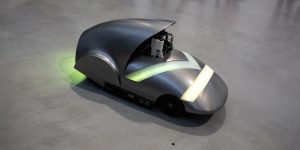
K – JKU’s Interactive Robocar
Institute for Machine Learning, LIT AI Lab, LIT Robopsychology Lab, Johannes Kepler University (AT); Inseq Design (AT)
K is a likeable little robocar: small in size, but very smart on board! Named after JKU’s famous patron, Johannes Kepler, it drives itself autonomously on changing terrain, can predict the movement patterns of pedestrians and playfully interacts with its environment.
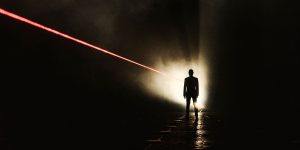
The Experimenta Garden - A Drone Opera (2015 – 2020)
Experimenta (AU)
The Experimenta Garden features the multi-platform work A Drone Opera (2015 – 2020)
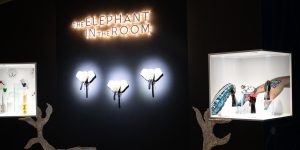
The Elephant in the Room
Melanie Baumgartner (AT), Florian Hartmann (AT), David Preninger (AT)
Nature-inspired robotics is collaborative, adaptable and ecological. With biodegradable and edible materials, new technologies that interact sustainably with humans and nature emerge. Imitations of an elephant's trunk embody such soft nature-inspired robots and interact quite naturally with visitors in Kepler's Gardens.
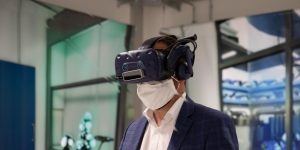
Robots Talking To Me
LIT Robopsychology Lab, Johannes Kepler University (AT)
How should robots communicate with people? What voice makes AI assistants sound trustworthy? Do we even have to listen to robots or should we always be in command ourselves? Under the title *Robots Talking to Me*, the *LIT Robopsychology Lab* presents four installations that give tangible expression to questions of human-machine relationships and invite participation.
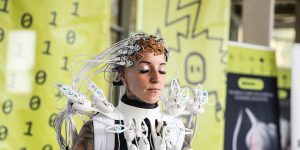
The Pangolin Scales
Thomas Faseth (AT), Harald Pretl (AT), Christoph Guger (AT), Anouk Wipprecht (NL)
The Pangolin Scales demonstrates the world’s first 1.024 channel brain-computer interface (BCI), which is able to extract information from the human brain with an unprecedented resolution to control an interactive, fashionable dress.
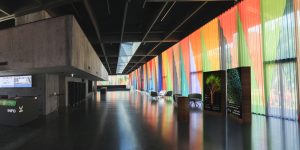
Treeversity
Johann Höller (AT), Thomas Lorenz (AT), Florian Gruber (AT), Ursula Niederländer (AT), Tanja Illetits-Motta (AT), Raphael Blasi (AT), Andreas Rösch (IT), Stefan Küll (AT)
Treeversity focuses on the relation between Big Data and data visualization to convey complex information at a glance. A mirror of the university’s inner workings, diligently recording success, failure and evolution. A portrait of its life in the form of a tree. Courses, grades and exams become branches, creating many different trees. Fully grown or nascent, withering or growing erratically. Treeversity shows the university as a forest, providing a tool to analyze its mechanisms at the same time.
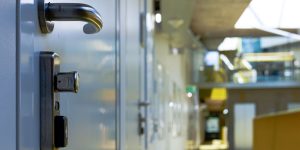
Exposed Building
Michael Roland (AT), Michael Mayr (AT), Robert Holzinger (AT), Markus Vogl (AT)
By opening a maintenance hatch and hacking into the network infrastructure behind it, we acquire access to the electronic locking system. By controlling the buzzers built into the office door locks, we transform the Science Park 2 building into an orchestra and it resounds like a huge walk-in instrument. The installation playfully provokes thought about the vulnerability of modern technology and its growing risks for society.
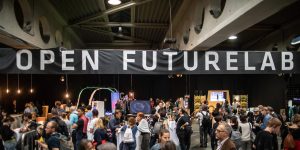
Open Futurelab Exhibition
The Open Futurelab Exhibition showcases the current research approaches and projects by the Ars Electronica Futurelab – Ars Electronica's Research and Development department.
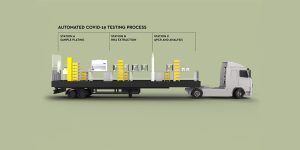
CONTAIN - Mobile COVID19 Emergency Testing Facilities
Open Cell (UK)
CONTAIN units are rapidly deployable COVID-19 testing laboratories housed in shipping containers. The design allows transportation to any location through standard shipping services. Automated RT-qPCR protocols can deliver 2,400 tests per unit in 24 hours.
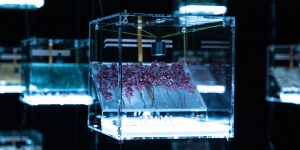
The Transparency of Randomness
Mathias Gartner (AT), Vera Tolazzi (AT)
"The Transparency of Randomness" is an interactive installation that provides insight into the world of randomness. Random numbers are continuously generated through a transparent dice system, to be used as the basis for real-time calculations and visualizations. Through its use of diverse materials, the process is influenced by the complexity of nature.
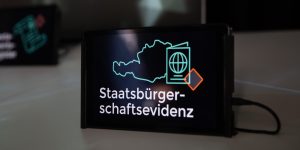
Digital Government in a Box
LIT Law Lab, Johannes Kepler University (AT)
From the “transparent citizen” and “social scoring” to AI-supported truth finding in the courtroom and machine-generated administrative notices: the digitization of administration and jurisdiction has many facets. It requires not only a consideration of what is technically possible, but also of what is legally permissible and what is desired in terms of legal policy. Against this background, the LIT Law Lab has two installations dedicated to the legal framework conditions (fundamental rights and data protection), problems and proposed solutions for a digitized enforcement.

Al truth machine
LIT Law Lab, Johannes Kepler Universität (AT)
From the “transparent citizen” and ”social scoring” to AI-supported truth finding in the courtroom and machine-generated administrative notices: the digitization of administration and jurisdiction has many facets. It requires not only a consideration of what is technically possible, but also what is legally permissible and what is desired in terms of legal policy. Against this background, the LIT Law Lab has two installations dedicated to the legal framework conditions (fundamental rights and data protection), problems and proposed solutions for a digitized enforcement.
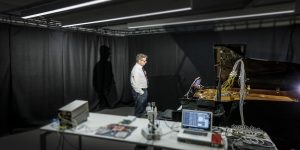
Biocomputer Rhythms
Interdisciplinary Centre for Computer Music Research (ICCMR), University of Plymouth (UK), Eduardo Reck Miranda (BR/UK)
Biocomputer Rhythms is a piece for prepared piano and percussion. It is a musical duet between a pianist and an intelligent interactive biocomputer. The biocomputer listens to the piano and produces musical responses during the performance. The responses are played on percussion instruments and on the piano by the pianist. The piano is prepared with electromagnetic actuators positioned inside the instrument to vibrate its strings. Electromagnetic actuators are also used to vibrate percussion instruments.
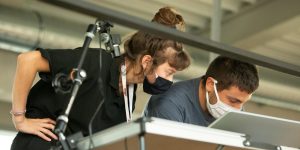
Performance Workshop: Enacting Innovation
Judith Igelsböck (AT), Friedrich Kirschner (DE), Sarah Buser (CH), Mónica Rikić (ES), Leoni Voegelin (CH), Tomás Montes Massa (CL), Laura Zoelzer (DE)
Enacting Innovation is a participatory staging of the social fabric surrounding contemporary innovation practices. Participants will negotiate the roles and situations that are frequently encountered in innovation processes and act out conflicts with each other and the technical infrastructures typically employed within such contexts. The simulation is inspired by research on ‘innovation scripts’ – the recipes followed in dealing with the omnipresent pressure to prove innovative ability.
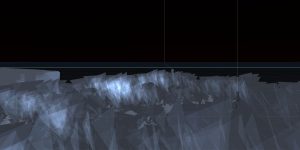
Random Rhetoric
MADE Group (GR)
“Random Rhetoric“ refers to computerized practices in politics, which are carried out through computers under the norm that political ideas operate as an outcome of mechanized processes and statistics, aiming at the absolute persuasion, the seduction of the audience, allured from the representation of a machine mimicking a human being.
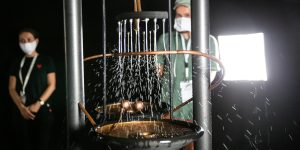
Dancing Water
Leon Kainz (AT)
This installation is based on a simple physical principle: the generation of electrostatic charges using water. The charged water droplets whirl in dynamic tracks around copper rods and react to nearby bodies. The collected charge can make a light bulb glow and generate flashes of lightning that can be centimetres long.
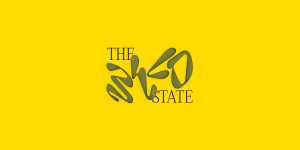
The Wild State
Campus
THE WILD STATE is the title of this year’s Kunstuniversität Campus activities at Hauptplatz Linz during Ars Electronica Festival 2020 from 9. – 13. September 2020. Existing since 2002, the intention of the Campus format is to invite outstanding international universities working in the academic fields of media arts and design. This year with an exhibition with contributions by various partner universities, as well as the departments Interface Cultures, Visual Communication, Fashion&Technology, Art Education, and Design: Tech.Tex. Special events comprise façade projection “Interfacing Hauptplatz”, the Internet flea market “Yami-ichi”, discursive format “Agora Digitalis” and the top notch nightline “Sound Campus”.
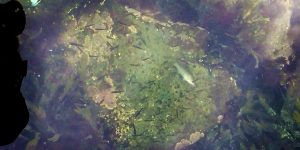
Oslofjord Ecologies Expedition
Art in Society Research Group and FeLT project, Oslo Metropolitan University (NO) in collaboration with SENT (NO)
The Oslofjord Garden is a wet and blue video tour of the fjord, encompassing site-specific footage as well as artists’ contributions, archival material and conversations with artists and scientists. The Oslofjord contains ecological connections and challenges that are specific and tangible, cultural practices and interactions. This work is based on the Oslofjord Ecologies artistic research platform and book, Oslofjord Ecologies. Artistic Research on Environmental and Social Sustainability.
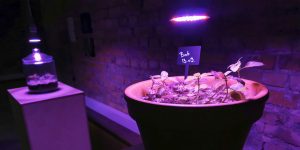
Planting a Resort for Mental Ecology
MPLab – Liepāja University Art Research Laboratory (LV)
People of Liepāja know very well that a garden is essential – without planting a park along the coast, the little seaside town would be consumed by sand, wind and water. The roots of trees keep the structure of the dunes stable, and people of Liepāja can retreat from the everyday struggles and storms in a safe garden environment.
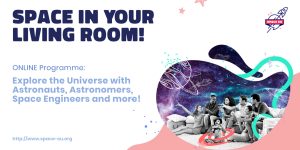
The Step into Space Garden
Leiden University (NL)
The Step into Space Garden is a journey of discovery through the story of space and your part in it. It presents online and in person events bring together space sciences and arts, through exhibitions and participatory activities with a focus on projects by and for youth.


